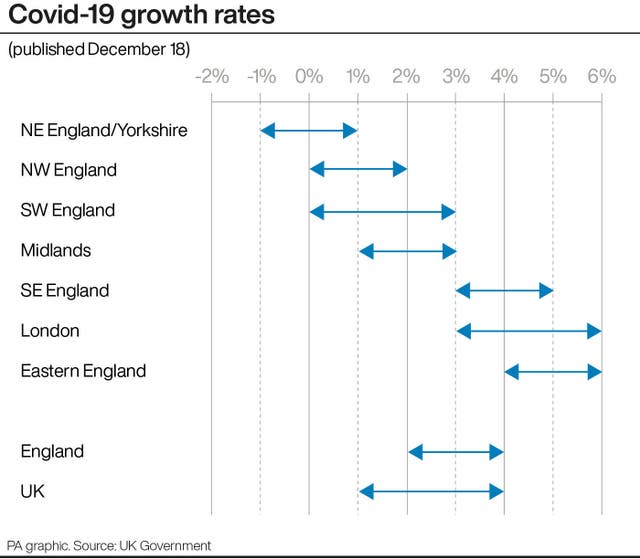
There are fears a new variant of coronavirus may be speeding up the spread of Covid-19, with Boris Johnson reportedly holding an emergency meeting with ministers yesterday.
According to reports, the PM yesterday held a meeting following the new variant.
Health Secretary Matt Hancock said there is nothing to suggest this new strain is more likely to cause serious disease. Professor Sir Mark Walport – a member of the government’s scientific advisory group for emergencies (Sage) added that there was a real possibility that the strain could have a “transmission advantage”.
But how concerned should members of the public be, and is it common for a new variant to emerge? Here's everything you need to know.
READ MORE: Coronavirus Scotland: Areas with most Covid cases this week
– Is this something unusual?
There have been many mutations in the virus since it emerged in 2019.
This is to be expected – SARS-CoV-2 is an RNA virus and these viruses mutate and change.
Public Health England (PHE) said that, as of December 13, 1,108 cases with this new variant had been identified, predominantly in the south and east of England.
It has been named VUI – 202012/01 – the first variant under investigation in December.
– Is this something to be worried about?
Not enough is yet known about the new strain, but it is premature to make any claims about the potential impacts of virus mutation.
But if the virus spreads faster it will be harder to control.
However, there have already been various strains of Covid-19 with no real consequence.
 Covid-19 growth rates (PA Graphics)
Covid-19 growth rates (PA Graphics)
It could potentially be serious, but not enough is known, and the surveillance and research will continue.
The Covid-19 Genomics UK (COG-UK) consortium said it is difficult to predict whether any given mutation is important when it first emerges and that it would take “considerable time and effort to test the effect of many thousands of combinations of mutations”.
It said the biggest concern is any changes that lead to an increase in reinfections or vaccine failure and that most attention is on mutations in the gene that encodes the spike protein.
There are currently around 4,000 mutations in the spike protein gene.
READ MORE: Christmas dinner offers “perfect conditions” for coronavirus to spread says expert
– Is it the first novel strain detected in the UK?
A number of variants have been detected using sequencing studies in the UK.
A specific variant (the D614G variant) has previously been detected in western Europe and North America which is believed to spread more easily but not cause greater illness.
But it is thought this is the first strain that will be investigated in such detail by PHE.
– Are new variants always a bad thing?
Not necessarily. They could even be less virulent.

However, if they spread more easily but cause the same disease severity, more people will end up becoming ill in a shorter period of time.
– Should we expect the virus to become more harmful?
Only changes that make viruses better for transmission are likely to be stable and result in new circulating strains.
The pressure on the virus to evolve is increased by the fact that so many millions of people have now been infected.
Most of the mutations will not be significant or give cause for concern, but some may give the virus an evolutionary advantage which may lead to higher transmission or mean it is more harmful.
– Will vaccines still work?
Matt Hancock said the latest clinical advice is that it is highly unlikely that this mutation would fail to respond to a vaccine.
The vaccine produces antibodies against many regions in the spike protein, and it is unlikely a single change would make the vaccine less effective.
However, this could happen over time as more mutations occur, as is the case every year with flu.
 Health Secretary Matt Hancock during a media briefing (PA Video)
Health Secretary Matt Hancock during a media briefing (PA Video)
PHE said this new variant includes a mutation in the spike protein and that changes in this part of the spike protein may result in the virus becoming more infectious and spreading more easily between people.
– So what are the scientists doing now?
Scientists will be growing the new strain in the lab to see how it responds.
This includes looking at whether it produces the same antibody response, how it reacts to the vaccine, and modelling the new strain.
It could take up to two weeks for this thorough process to be complete.
COG-UK is carrying out random sequencing of positive samples across the UK to compile a sequencing coverage report, which is sent to each of the four public health agencies each week.
It said random sampling is important to capture regional coverage.
– If it’s not that big a deal, why do we care?
While other variants have been identified in the past, it appears this particular strain is spreading quite fast, meaning it could be more transmissible, and therefore warrants further investigation.
Professor Sir Mark Walport – a member of the Government’s Scientific Advisory Group for Emergencies (Sage) – said there was a possibility that it could have a “transmission advantage”.
– What examples are there of other virus strains?
The Danish government culled millions of mink after it emerged that hundreds of Covid-19 cases in the country were associated with SARS-CoV-2 variants associated with farmed minks — including 12 cases with a unique variant, reported on November 5.
In October a study suggested that a coronavirus variant that originated in Spanish farm workers spread rapidly throughout Europe and accounted for most UK cases.
The variant, called 20A.EU1, is known to have spread from farm workers to local populations in Spain in June and July, with people then returning from holiday in Spain most likely playing a key role in spreading the strain across Europe.


Why are you making commenting on The Herald only available to subscribers?
It should have been a safe space for informed debate, somewhere for readers to discuss issues around the biggest stories of the day, but all too often the below the line comments on most websites have become bogged down by off-topic discussions and abuse.
heraldscotland.com is tackling this problem by allowing only subscribers to comment.
We are doing this to improve the experience for our loyal readers and we believe it will reduce the ability of trolls and troublemakers, who occasionally find their way onto our site, to abuse our journalists and readers. We also hope it will help the comments section fulfil its promise as a part of Scotland's conversation with itself.
We are lucky at The Herald. We are read by an informed, educated readership who can add their knowledge and insights to our stories.
That is invaluable.
We are making the subscriber-only change to support our valued readers, who tell us they don't want the site cluttered up with irrelevant comments, untruths and abuse.
In the past, the journalist’s job was to collect and distribute information to the audience. Technology means that readers can shape a discussion. We look forward to hearing from you on heraldscotland.com
Comments & Moderation
Readers’ comments: You are personally liable for the content of any comments you upload to this website, so please act responsibly. We do not pre-moderate or monitor readers’ comments appearing on our websites, but we do post-moderate in response to complaints we receive or otherwise when a potential problem comes to our attention. You can make a complaint by using the ‘report this post’ link . We may then apply our discretion under the user terms to amend or delete comments.
Post moderation is undertaken full-time 9am-6pm on weekdays, and on a part-time basis outwith those hours.
Read the rules here